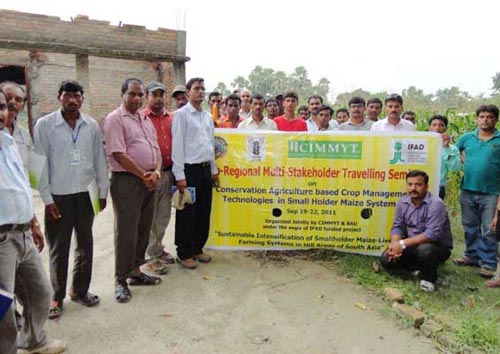 During 19-22 September 2011, Birsa Agricultural University (BAU), Jharkhand, India, hosted the Sub-Regional Multi-Stakeholder Travelling Seminar entitled “Conservation Agriculture Based Crop Management Technologies in Smallholder Maize Systems.” Organized jointly by BAU and CIMMYT-India, under the aegis of the IFAD “Sustainable Intensification of Smallholder Maize-Livestock Farming Systems in Hill Areas of South Asia” project, the seminar was attended by 37 scientists, extension agents and NGO representatives, students from Krishi Vigyan Kendra’s (KVKs) and BAU, and farmers from the three districts of Jharkhand.
During 19-22 September 2011, Birsa Agricultural University (BAU), Jharkhand, India, hosted the Sub-Regional Multi-Stakeholder Travelling Seminar entitled “Conservation Agriculture Based Crop Management Technologies in Smallholder Maize Systems.” Organized jointly by BAU and CIMMYT-India, under the aegis of the IFAD “Sustainable Intensification of Smallholder Maize-Livestock Farming Systems in Hill Areas of South Asia” project, the seminar was attended by 37 scientists, extension agents and NGO representatives, students from Krishi Vigyan Kendra’s (KVKs) and BAU, and farmers from the three districts of Jharkhand.
MP Pandey, Vice Chancellor, BAU Ranchi, opened the seminar and said that the “development and deployment of conservation agriculture (CA) in rainfed smallholder farming systems is critical to addressing the challenges of food and livelihood security.” CA is being widely adopted in India and CIMMYT is collaborating with national agricultural research systems to further deploy the techniques in the region. Pandey highlighted CIMMYT’s current IFAD project, which is being initiated with BAU, KVKs, the Indian Council of Agricultural Research, and other NGOs, to develop and deploy CA in rainfed systems of Jharkhand. To accelerate the adoption of CA in Jharkhand, cross-learning and capacity building through events such as the travelling seminar are vital, he added. The inauguration was also attended by BAU Ranchi’s BN Singh (Director of Research) and RPS Ratan (Director of Extension Education), and members of the CIMMYT team in Jharkhand.
The seminar gave participants the opportunity to see the CA procedures occurring in maize systems in the IFAD project in Jharkhand, and the work of CIMMYT and CSISA in Bihar. Demonstrations included farmerparticipatory innovations, intercropping systems, seed production of maize inbreds and hybrids, and component technologies such as spray techniques, water and nutrient management, and small-scale CA machinery. Participants were exposed to strategic, adaptive research CA modules, with the key message being that CA-based crop management technologies promote greater resilience of farming systems for resource-poor farmers and risk-prone rainfed ecologies of eastern India.

